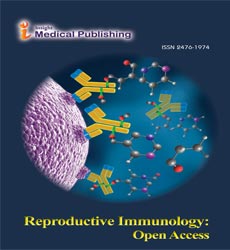Abstract
NF-kB Regulation in T-cells in Pregnancy is Mediated via Fas/FasL Interactions: The Signal for which is Derived from Exosomes Present in Maternal Plasma
Background: Regulated suppression of maternal Th1 immunity is necessary for normal pregnancy since inappropriate Th1 responses results in increased pregnancy loss and complications including intrauterine growth restriction (IUGR). We have shown that suppression of the p65 subunit of NF-κB in maternal T-cells underlies this change in T-cell responses. This study aimed to determine mechanism(s) that control p65 suppression. Methods and findings: Maternal plasma contained particulate factor’s that suppress p65 and induce T-cell apoptosis in Jurkat T-cells and the factor’s was positive for FasL and TRAIL. Both the Fas activating antibody CH11 and recombinant human TRAIL induced Jurkat apoptosis. Specific Fas activation resulted in p65 suppression which was reversed in the presence of the Fas inactivating antibody ZB4. Despite inducing apoptosis, recombinant TRAIL did not suppress p65 expression. Maternal T-cells expressed increased Fas relative to non-pregnant controls. Fas activation in Jurkats resulted in p65 suppression thus limited IL-2 and IFNÃÆïÃâÃÂÃâç transcription in response to PMA/ionomycin stimulation. In contrast, partial knockdown of Fas in Jurkats prevented suppression of p65 in response to CH11, leading to increased IL-2 and IFNÃÆïÃâÃÂÃâç production when stimulated with PMA/ionomycin. FasL+ Exosomes isolated from the particulate fraction of maternal plasma specifically induced p65 suppression in Jurkats since suppression was completely reversed with ZB4. In pregnancies complicated with IUGR where Th1 cytokine production is increased, placental expression of FasL was reduced compared to normal controls. Conclusion: Taken together these data suggest that pregnancy derived FasL+ exosomes in maternal plasma regulate p65 levels in circulating T-cells through Fas activation. The expression of Fas on T-cells and FasL on exosomes both dictate the level of p65 suppression and the level of cytokine production in response to stimulation throughout pregnancy. Inappropriate expression of FasL in placental derived exosomes may underlie one mechanism that is abnormal in complications of pregnancy including IUGR.
Author(s):
Sharon A McCracken, Katrina A Hadfield, Vanessa M Yenson, Gaayathri Ariyakumar, Kelly J McKelvey, Narelle Woodland, Anthony W Ashton and Jonathan M Morris.
Abstract | Full-Text | PDF
Share this

Google scholar citation report
Citations : 237
Reproductive Immunology: Open Access received 237 citations as per google scholar report
Abstracted/Indexed in
- Google Scholar
- Sherpa Romeo
- China National Knowledge Infrastructure (CNKI)
- Secret Search Engine Labs
Open Access Journals
- Aquaculture & Veterinary Science
- Chemistry & Chemical Sciences
- Clinical Sciences
- Engineering
- General Science
- Genetics & Molecular Biology
- Health Care & Nursing
- Immunology & Microbiology
- Materials Science
- Mathematics & Physics
- Medical Sciences
- Neurology & Psychiatry
- Oncology & Cancer Science
- Pharmaceutical Sciences

